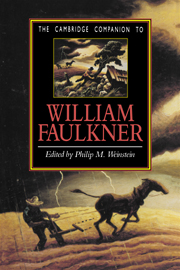4 - Faulkner from a European Perspective
from Part I - The Texts in the World
Published online by Cambridge University Press: 28 May 2006
Summary
From Cleanth Brooks, the champion of the New Criticism, to the present New Historians, Faulkner’s Southernness has been a permanent and central concern of American criticism. Much has been written too about Joyce’s Irishness, but today it is certainly no longer a priority for Joyceans, and to dwell at length on Proust’s Frenchness would strike most Proustians as utterly incongruous. Admittedly, Faulkner’s fiction is more patently grounded in a specific geographic area and a specific historical experience than that of any of his contemporaries, yet some thought should perhaps be given to the troubling fact that, year after year, his novels are read with excitement by thousands of people all over the world, most of whom will never know another South than his - a world within words.
Faulkner was American and Southern, through and through; his literary ancestry can easily be traced back to Poe, Hawthorne, Melville, Twain, and Sherwood Anderson; his indebtedness to the popular traditions of Southern oratory and Southwestern humor has been established beyond dispute. Like all major American novelists, however, Faulkner is nonetheless a novelist of European descent. His many fathers include Cervantes, Scott, Balzac, Dickens, Flaubert, Dostoevsky, Hardy, Conrad, Mann, Joyce, and Proust, to mention only the novelists. Faulkner’s intertext is just as thick as that of any of his peers, and just as heedless of national and regional boundaries
- Type
- Chapter
- Information
- The Cambridge Companion to William Faulkner , pp. 75 - 95Publisher: Cambridge University PressPrint publication year: 1995
- 1
- Cited by



